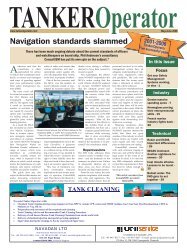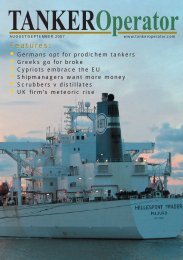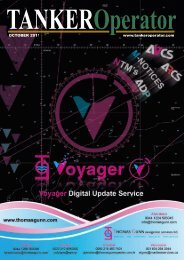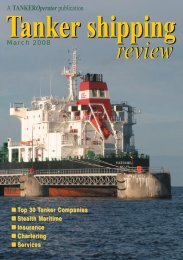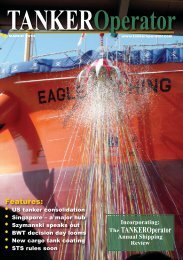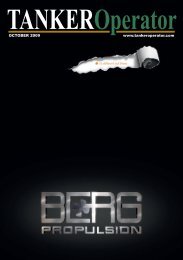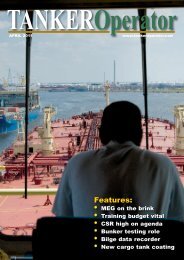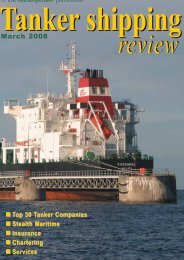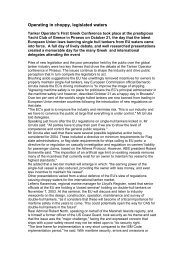Features: - Tanker Operator
Features: - Tanker Operator
Features: - Tanker Operator
You also want an ePaper? Increase the reach of your titles
YUMPU automatically turns print PDFs into web optimized ePapers that Google loves.
INDUSTRY - BUNKERS<br />
Low sulphur marine<br />
gas oil quality could<br />
increase switching risks<br />
Fuel quality problems associated with low sulphur heavy fuel oil, combined with the<br />
current regional quality of low sulphur gas oil, pose a potential increased risk<br />
to engines when a switch to marine gas oil is subsequently made*.<br />
Cascading attempts to limit sulphur<br />
emissions around the world mean<br />
that ship operators already using<br />
low sulphur fuel oil could now<br />
face a greater machinery risk as they switch to<br />
low sulphur marine gas oil to meet new<br />
requirements in Europe and California.<br />
Although more expensive, low sulphur heavy<br />
fuel oil (LSFO) does, in some specific areas<br />
and from some specific suppliers, offer<br />
increased challenges compared to the quality of<br />
normal heavy fuel oil (HFO). This can leave an<br />
engine with problems that are exacerbated by<br />
change-over to low viscosity marine gas oil<br />
(MGO). Reduced maximum engine output,<br />
reduced starting performance, reduced low load<br />
performance and even, at worst, black-outs and<br />
the consequent risk of oil spills and loss of life<br />
at sea, may be the result.<br />
“Prior to 1st January 2010, vessels calling to<br />
European ports could choose their fuel strategies<br />
but the requirement to use 0.1% sulphur fuel at<br />
berth effectively means switches involving<br />
marine gas oil,” said John Stirling, business<br />
development manager of Det Norske Veritas<br />
Petroleum Services (DNVPS). “Ensuring fuel<br />
quality and understanding engine performance<br />
will be paramount in preventing failures such as<br />
those already seen in California and this will<br />
require a more sophisticated understanding of<br />
fuel properties for both operators and crew.”<br />
DNVPS has acted as project manager for a<br />
research project called Marine Use of Low<br />
The Bominflot Network<br />
Europe / Africa<br />
Hamburg<br />
Bremerhaven<br />
Kiel<br />
Rostock<br />
Scandinavia<br />
London<br />
Rotterdam<br />
Madrid<br />
Gibraltar<br />
Ceuta<br />
Las Palmas<br />
Malta<br />
Athens<br />
Tallinn<br />
St. Petersburg<br />
Cape Town<br />
The Americas<br />
Houston<br />
New Orleans<br />
Delaware<br />
Norfolk<br />
New York<br />
Panama<br />
Buenos Aires<br />
Rio de Janeiro<br />
Ecuador<br />
Far/Middle East<br />
Singapore<br />
Hong Kong<br />
Shenzhen<br />
Shanghai<br />
Taipei<br />
Seoul<br />
Mumbai<br />
Fujairah<br />
and services<br />
available in all<br />
other ports<br />
Bominfl ot is an international<br />
company operating<br />
around the globe, with<br />
more than 30 years of<br />
experience in the bunker market. Our business portfolio<br />
covers activities ranging from cargo trading to<br />
the supply of bunker fuels, lubricants and other services<br />
of crucial importance to the shipping industry:<br />
at competitive prices<br />
energy<br />
at work<br />
Bominfl ot imposes strict<br />
standards on all its operations,<br />
and accepts<br />
nothing less. We offer<br />
round-the-clock service, whenever and wherever<br />
you need us. You can always count on Bominfl ot at<br />
your next port of call.<br />
Choose a dynamic partner: www.bominfl ot.net<br />
November/December 2009 TANKER<strong>Operator</strong> 23



